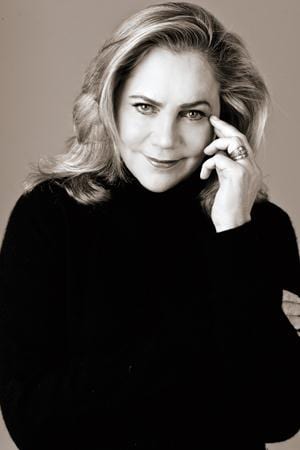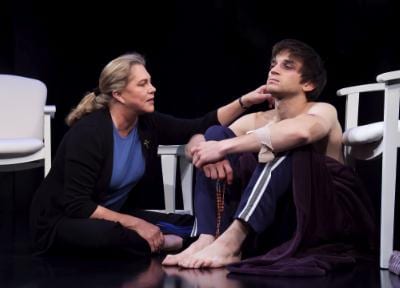
Credit: Lanny Nagler
Of course it’s the voice that hits you first, deeper than many men’s voices, yet unmistakably feminine. Seductive. Smoky. Instantly recognizable. Kathleen Turner makes Lauren Bacall sound like a soprano.
She looks damn good, holding strong at 57 years young after a shaky spell in therapy for chronic rheumatoid arthritis. The sexpot ’80s siren came through that struggle, evolving into a serious actress of a certain age.
Good thing, too, given the heavyweight stage roles she’s taken on in the last few years. From The Graduate to Who’s Afraid of Virginia Woolf?, Turner’s seasoned but beautiful visage has only accentuated the acting chops that kept her on Hollywood screens long past the point most actresses’ best-before dates pass. Still, it’s largely stage roles that keep her busy these days, including a much-anticipated upcoming run in Matthew Lombardo’s High, a play about drugs, sex, faith and despair.
It’s not an easy play. Lombardo eschews the glamorization of party culture as he paints a vivid and all-too-real picture of a young gay hustler’s methamphetamine addiction and the troubled nun who tries to save him. As Sister Jamison Connelly, Turner is called upon to be both tough and funny as she coaxes, cajoles and bullies Cody Randall into facing up to his addiction. It’s a brutal journey for the pair, as Connelly’s own history of drug and alcohol abuse both helps and hinders her work with Cody.
“I think Jamie is trying to save herself,” Turner says. “One of the most intriguing things about her is that she comes across as being really strong, but she’s so damaged. How did she go from years of her own damage and self-destructive behaviour to helping others through their own passage? This is a real journey that this woman’s been on.”
As Sister Jamie and Cody continue their dance of clashing and connecting, it becomes clear that Lombardo’s tale of drugs and recovery isn’t some after-school TV special set onstage. Jamie is at least as foul-mouthed as her young charge, and there are no tidy solutions provided to the scourge of crystal meth — something that first attracted Turner to the piece.
“It’s such a terrible addiction,” she says. “The most destructive there is, I think. We know that methamphetamine literally destroys synapses in the brain, and it takes at least five years for them to grow back. Matthew believes very strongly that there is no cure, that without constant vigilance you can fall back into the patterns you had before. It’s always there waiting.”
As a recovering addict himself, Lombardo’s script is all too real — perhaps a factor in High’s prematurely cancelled run on Broadway in April of last year. Turner readily admits the team was unprepared when it hit the Great White Way but points to the play’s enduring life as a touring show as proof of its appeal.
“We screwed up on Broadway,” she says. “I think we rushed it a little. It’s the brilliance of hindsight. I didn’t buy it, and neither did the audience.”
Nevertheless, Turner believed in the play, and in Sister Jamison’s path from addiction to healing. It’s a journey the actress has shared, if in a somewhat more subdued fashion. Diagnosed with crippling rheumatoid arthritis back in 1992, Turner turned to alcohol to dull the pain. While it helped her to maintain a gruelling career schedule, it quickly became clear that something was amiss.
“I was self-medicating,” she says, with refreshing candour. “It’s very hard to describe what it’s like to live in a state of chronic endless pain, knowing there is no posture, no one thing that will give you relief. The abusing of alcohol was helping the pain, but then it was starting to screw my mind up, and I can’t act well if I can’t think properly. I mean, for me, it’s my daughter and acting. That’s all that’s important.
“I finished my work commitment and went to a clinic to find out exactly what this was. I did two weeks there and learned, thankfully, that it was not my path. But it certainly informed me about Jamie and gave me great compassion towards her.”
Now in remission from the arthritis, Turner credits both medical treatments and physiotherapy for the suppleness of movement she now enjoys. “You have to keep moving,” she says. “I don’t care how much it hurts, you have to get into the pool and move. The water will give you the resistance and support you need to keep going.”
It also helps in keeping up with her talented (and breathtakingly gorgeous — look out for his full-frontal!) co-star Evan Jonigkeit as they reunite to tour with the retooled production. “He’s one of the best actors I’ve come across in a long time,” Turner says. “He was the easiest thing to cast. I read with him, he walked out of the room, and I said, ‘We got it, guys.’
“You have to be careful because you’re going to end up working with these people as equals, so you don’t want to create any sort of barrier or class system. You need to be co-workers, and I couldn’t ask for better in Evan.” Certainly a far cry from some of her less-amenable co-stars over the years. While Turner has nothing but praise for most of her acting comrades, there have been one or two misfires.
“I like all my movies, frankly,” she says. “Except for Switching Channels. I got stuck with Burt Reynolds when I was supposed to be with Michael Caine. But I was pregnant, so we had a schedule to keep.”
She cites Romancing the Stone and War of the Roses as two of her favourites, but, despite a slew of film classics, Turner admits to feeling most at home on the stage.
“In film, a lot of the times I feel very contained,” she says. “They’re always saying I’m too loud or I’m acting too big. But then I get to go on stage and go, ‘Ploof! Yeah! Don’t stop me now!’”

 Why you can trust Xtra
Why you can trust Xtra


